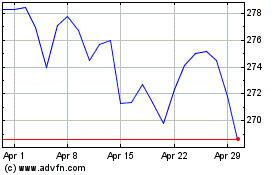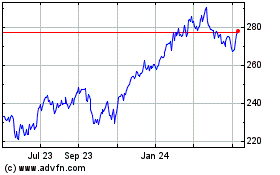Ahead of the Tape: Don't Expect Shock From Visa -- WSJ
October 24 2016 - 3:02AM
Dow Jones News
By Steven Russolillo
The so-called quiet period before Visa Inc.'s coming earnings
report has been anything but that.
Just last week, Visa announced its chief executive was
resigning, it boosted its dividend and it announced a new
bitcoin-style network. Next up is Monday's earnings report. If
history is a guide, the release should offer fewer surprises.
Analysts polled by FactSet estimate Visa earned 73 cents a share
in the third quarter, up 17% from a year ago. The actual number
likely won't deviate much. The card giant has exceeded Wall
Street's estimates with uncanny regularity, missing earnings
forecasts only twice in the past five years. Both misses were
slight.
Like rival MasterCard Inc., Visa is a payment network that
processes credit-card and debit-card transactions, making a
percentage off each. It doesn't issue cards, lend money or set
interest rates, so it doesn't assume credit risk. That has allowed
it to benefit in recent years as consumers increasingly pay with
plastic.
Visa's stock has been a big winner since it returned to the
public markets in March 2008, rising 23% compounded annually and
far outpacing the S&P 500. Yet it now faces stiff competition,
with many financial-technology startups aiming to disrupt
traditional payments. So far, Visa hasn't just navigated this
environment well, but also maintained its position as the dominant
payments player. It has partnered with some fintech companies with
the hope of boosting the use of electronic payments globally.
In a deal announced over the summer, PayPal Holdings Inc. agreed
to stop steering customers away from Visa cards. In return, Visa
will make PayPal part of its "digital wallet" and won't increase
fees that it charges to PayPal. This should boost transactions made
on Visa-branded cards. Visa also has supported Apple Inc.'s Apple
Pay and invested in mobile-payments company Square Inc.
Wall Street has applauded these moves. Roughly four of five
analysts who cover the stock rate it a "buy," the highest
percentage since 2011. And while shares fetch a higher-than-average
25 times projected earnings, that is roughly in line with both
MasterCard and PayPal.
Many assume the future of finance will be dominated by digital
disrupters. Don't discount the old guard just yet.
Write to Steven Russolillo at steven.russolillo@wsj.com
(END) Dow Jones Newswires
October 24, 2016 02:47 ET (06:47 GMT)
Copyright (c) 2016 Dow Jones & Company, Inc.
Visa (NYSE:V)
Historical Stock Chart
From Mar 2024 to Apr 2024

Visa (NYSE:V)
Historical Stock Chart
From Apr 2023 to Apr 2024
